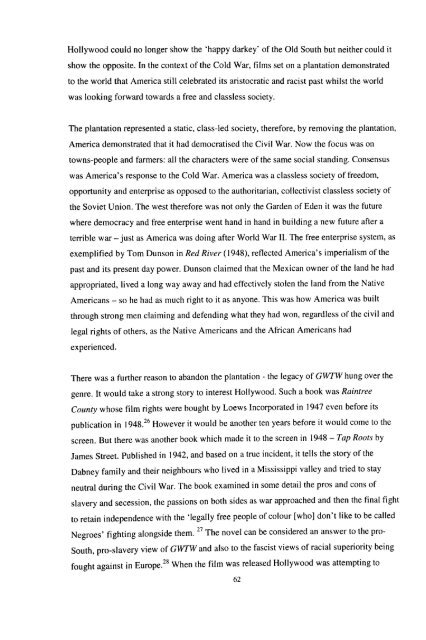Download (3483kB) - Greenwich Academic Literature Archive ...
Download (3483kB) - Greenwich Academic Literature Archive ...
Download (3483kB) - Greenwich Academic Literature Archive ...
- No tags were found...
Create successful ePaper yourself
Turn your PDF publications into a flip-book with our unique Google optimized e-Paper software.
Hollywood could no longer show the 'happy darkey' of the Old South but neither could itshow the opposite. In the context of the Cold War, films set on a plantation demonstratedto the world that America still celebrated its aristocratic and racist past whilst the worldwas looking forward towards a free and classless society.The plantation represented a static, class-led society, therefore, by removing the plantation,America demonstrated that it had democratised the Civil War. Now the focus was ontowns-people and farmers: all the characters were of the same social standing. Consensuswas America's response to the Cold War. America was a classless society of freedom,opportunity and enterprise as opposed to the authoritarian, collectivist classless society ofthe Soviet Union. The west therefore was not only the Garden of Eden it was the futurewhere democracy and free enterprise went hand in hand in building a new future after aterrible war -just as America was doing after World War II. The free enterprise system, asexemplified by Tom Dunson in Red River (1948), reflected America's imperialism of thepast and its present day power. Dunson claimed that the Mexican owner of the land he hadappropriated, lived a long way away and had effectively stolen the land from the NativeAmericans - so he had as much right to it as anyone. This was how America was builtthrough strong men claiming and defending what they had won, regardless of the civil andlegal rights of others, as the Native Americans and the African Americans hadexperienced.There was a further reason to abandon the plantation - the legacy of GWTW hung over thegenre. It would take a strong story to interest Hollywood. Such a book was RaintreeCounty whose film rights were bought by Loews Incorporated in 1947 even before itspublication in 1948.26 However it would be another ten years before it would come to thescreen. But there was another book which made it to the screen in 1948 - Tap Roots byJames Street. Published in 1942, and based on a true incident, it tells the story of theDabney family and their neighbours who lived in a Mississippi valley and tried to stayneutral during the Civil War. The book examined in some detail the pros and cons ofslavery and secession, the passions on both sides as war approached and then the final fightto retain independence with the 'legally free people of colour [who] don't like to be calledNegroes' fighting alongside them. 27 The novel can be considered an answer to the pro-South, pro-slavery view of GWTWand also to the fascist views of racial superiority beingfought against in Europe. 28 When the film was released Hollywood was attempting to62
















